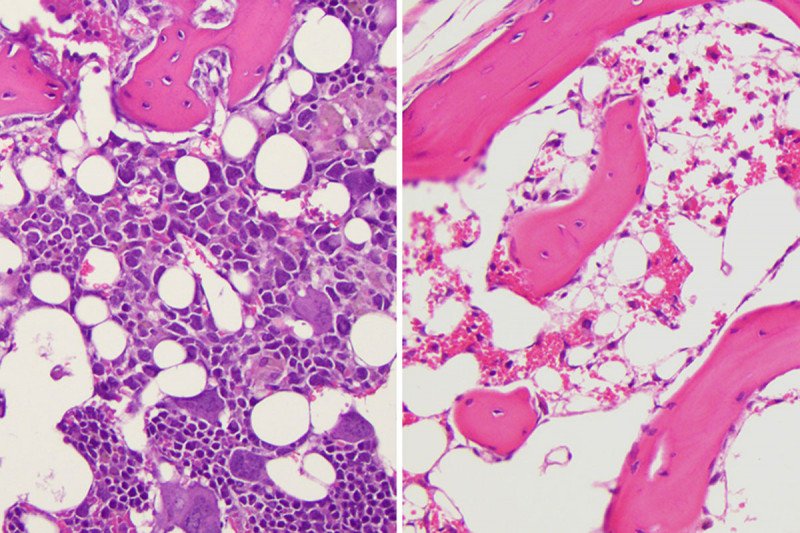
Antibiotic treatment that depletes gut flora slows down regrowth of immune cells in the bone marrow. At right, mice with a disrupted gut flora showed very little regeneration of immune cells compared with animals with an intact gut flora (left).
For people with blood cancers, a bone marrow transplant (BMT) can be a lifesaving treatment option. But the procedure can have dangerous side effects, including an increased susceptibility to infections during the time it takes for the bone marrow to produce new immune cells. As a result, BMT patients must receive antibiotics as a precaution.
New research from the lab of Sloan Kettering Institute immunologist Marcel van den Brink, Co-Director of the Parker Institute for Cancer Immunotherapy at Memorial Sloan Kettering, suggests ways to improve immune system recovery after a BMT.
Hint: Trust your gut.
The researchers used a mouse model of bone marrow transplantation to examine the relationship between antibiotics and immune system recovery. They found that the immune system was slower to regrow in antibiotic-treated animals, compared with animals that did not receive antibiotics. The difference, they discovered, was due to a reduction in number and diversity of gut microbes — what scientists call the intestinal microbiota — in the antibiotic-treated mice.
Microbes: They Do a Body Good
What might gut microbes have to do with a regrowing immune system? These microscopic residents do many things for the animals they live inside. One important job is helping their hosts obtain nutrition from the foods they eat. This nourishment, it turns out, is also key for repairing the immune system after a BMT, and antibiotic-treated mice aren’t getting enough.
But there was a simple fix: The team discovered that the effect of a depleted microbiota could be offset by supplementing the mice’s drinking water with a little bit of sugar (equivalent to about 7% of a mouse’s average daily calories).
“That a seemingly small and simple intervention can improve immune recovery after bone marrow transplant was quite striking to me,” says Anna Staffas, a postdoctoral fellow in the van den Brink laboratory and the first author of a new paper published in the journal Cell Host & Microbe.
The results suggest that people receiving a BMT might benefit from nutritional or dietary changes that help compensate for the loss of intestinal microbiota that follows treatment with antibiotics.
Dr. van den Brink’s lab had previously shown that the types of antibiotics a person receives after a BMT, and the diversity and extent of their gut flora, can influence how well they do after a BMT. This latest research extends the role of gut flora to providing key nutritional benefits that support immune recovery.
MSK is currently conducting clinical trials to test a variety of nutritional strategies to boost immune system recovery in people who receive a BMT.



